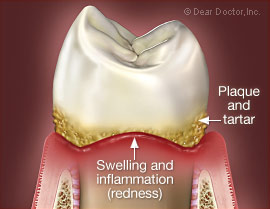Bleeding Gums
A very important warning sign of gum disease
Dear Doctor,
My gums always bleed in the morning when I brush. Is this normal or am I brushing too hard?
 |
| An illustration showing inflammation (redness) and swelling of the gum tissue. Notice the plaque and tartar which is the cause of the inflammation. |
Dear Justin,
The most common cause of bleeding gums is the accumulation of dental plaque (bacterial deposits) where the teeth meet the gums. Because it is usually painless, many people think it is normal, but it isn't. If your gums bleed when you brush, it might be that you are brushing too hard or using a very hard brush and cutting the gums, but that is not likely because it would be painful. It is most probable that you are not brushing effectively.
Dental plaque is a soft whitish film composed of bacteria that accumulates at the gum line in the absence of effective daily removal. The bacteria cause the gum tissues to become inflamed, which is known as gingivitis. These bacteria, present in everyone's mouth, form a film or “plaque” which is not easily visible, and therefore difficult to detect. The gums become red and swollen (at least to a dentist's eye), and may bleed easily on contact with a toothbrush or floss. Brushing correctly at the gum line will remove alot of the plaque, but significant bacterial plaque deposits will remain in between the teeth where a toothbrush can't reach. The use of dental floss, toothpicks, or small brushes is necessary to eliminate the bacterial plaque between the teeth.
If plaque continues to accumulate over time, continuing gum inflammation can lead to break down of the normal attachment between the teeth and the gums, causing separation known as “pocket” formation. At this point the bleeding may or may not stop, but the process will silently continue inside the pockets. As the inflammation progresses it can lead to periodontal disease (peri-around, odont-tooth) resulting in loss of bone which supports the teeth and possibly eventual tooth loss. About 90% of the population has bleeding gums at some time or another and approximately 10% go on to develop periodontal disease. An examination including checking for bleeding areas and pockets, including radiographs (x-rays), are used to determine the extent of gum or periodontal disease.
In addition, it is important to see your dentist or a periodontist (a specialist in diagnosis and treatment of periodontal diseases). A medical history as part of a thorough examination is important to determine exactly why your gums are bleeding because plaque alone may be only part of the reason. For example quite commonly in women, elevated hormone levels caused by birth control pills or pregnancy, increase blood vessel response in the gum tissues causing an exaggerated response to plaque so that they bleed more easily. Some oral infections or other more serious systemic (bodily) diseases can also cause changes in the mouth and bleeding of the gums. Some medications can have side effects influencing the gums and oral (mouth) tissues.
Thorough oral hygiene can remove much of the soft plaque, but a professional cleaning is needed to remove calcified plaque (tartar or calculus). A dentist or hygienist can teach you proper brushing and home care methods; nobody knows how to do it properly unless they're taught.
In conclusion, bleeding from the gums on brushing is the sign of a problem which requires attention and diagnosis by a dental professional. Daily removal of bacterial plaque, along with regular periodontal cleanings will enable you to have a healthy mouth with healthy teeth and gums. Thank you for asking this important question.




